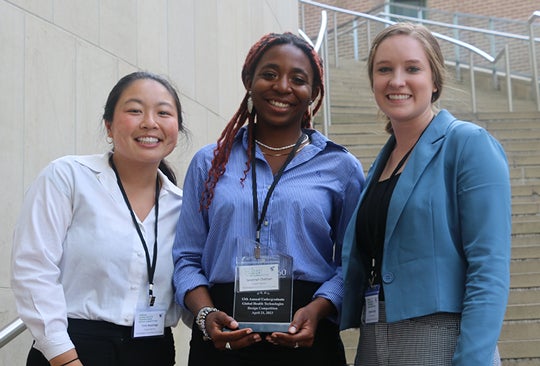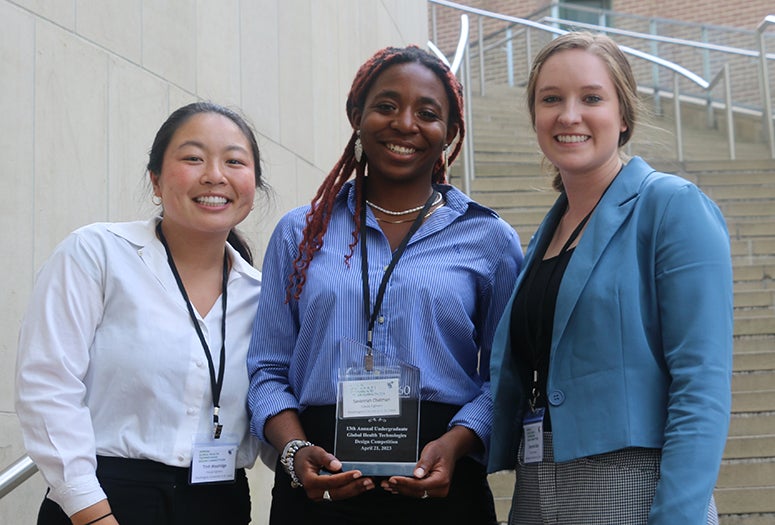By Carrie Noxon
Special to Rice News
Fistula Fighters, a team of Washington University in St. Louis undergraduates, won first place at the Rice360 Institute for Global Health Technologies’ annual Global Health Technologies Design Competition April 21 for its innovative design of a discrete urine collection system that would allow mothers to avoid the stigma and embarrassment from incontinence that can result from prolonged, obstructed labor.

Fistula Fighters team members Savannah Chatman, Samantha Olson and Trinh Woolridge took home the competition’s $500 top prize with their design of a custom-fitted urine collection cup and bag that are discretely integrated into a pair of bicycle shorts that can be worn under skirts or pants. The award-winning innovation addresses the management of urinary incontinence caused by a vesicovaginal fistula, an abnormal opening between the bladder and vaginal wall that causes involuntary discharge of urine from the vagina.
Fistula Fighters competed against 27 teams from eight countries: Bangladesh, Canada, Colombia, Kenya, Malawi, Nigeria, Tanzania, and the United States. All teams presented designs for low-cost technologies that addressed global health challenges in resource-limited settings.
For the first time in the competition’s 13-year history, cash awards were presented to winning teams thanks to a gift from Rice alumna Ning Li ’97.
Second place went to Rice’s Team TestTSH for its novel design of an easy-to-read, low-cost thyroid hormone test for newborns. The $350 prize went to team members Alex David, Elise Erickson, Vanshika Jhonsa, Margaret Li, and Alison Maniace.
Saint Louis University’s Team Anemia Assessment in Resource-Poor Regions took the $250 prize for third place. Team members included Amogh Chariyamane, Jake Little, Kevin Noonan, and Andrew Kotz.
The Crystal Sea Award, a $500 prize for the project that best expanded innovation in materials sciences or digital innovation, went to Team Baby Belt from Bangladesh University for Engineering and Technology. Team members Tasmia Rahman Aanika, Asfina Hassan Juicy, and Mahmud Wasif Nafeehat created a low-cost fetal heartbeat and uterine contraction monitor that can be used in the home to detect signs of preterm labor. The award honored Li’s grandfather, Haiqing Du, a materials science professor at Hunan University China.
Team Pathfinder of Ladoke Akintola University of Technology in Nigeria took home the $500 prize for the Diversity, Equity and Inclusion Award. The team’s lead innovator, Taoheed Oyewo, and team members Emmanuel Ayanwole, John Coker, Patrick Obumselu and Victoria Akintayo were recognized for best addressing diversity, equity and inclusion throughout the process of designing an accessibility-focused sanitary seat and cover to be used with open toilets, which are common throughout the world.
The People’s Choice Award went to Team BambasúAid from Universidad de Los Andes, Colombia. Team members Andrea Gomez and Andres Tarquino won the $350 prize after their design of a pediatric monitor for congenital heart conditions captured more than 14,000 votes on the design competition’s People’s Choice website. Though voting is closed, all project videos can still be viewed on the site.
Rice360’s annual Leadership in Global Health Awards were presented to both Theresa Mkandawire, associate professor and former dean of engineering at Malawi University of Business and Applied Sciences, and Renuka Gadde, senior adviseor to the Clinton Health Access Initiative (CHAI), the competition’s keynote speakers.
Mkandawire grew up in a village with few role models, but teachers inspired her to focus on engineering and she went on to become the only woman in her university’s engineering program. In her introduction of Mkandawire, Rice 360 co-director Maria Oden used the Malawi engineer’s trailblazing experiences to stress the importance of supporting marginalized groups’ entry into science, technology, engineering and mathematics.
Mkandawire said, “I know that this is a competition, but I want to say to you all that as young people participating in STEM, from my perspective, you are all winners. You are winners for finding solutions to these important problems through engineering.”
Gadde related some of her experiences working on global health initiatives, both in the private-sector with medical device company BD and in her current work with CHAI. She encouraged students to travel and “be in the setting where you are trying to solve a problem.” She also recommended students pursue innovations in diagnostic technologies for global health, citing the international development community’s emerging interest in the space.
“I am often asked how one becomes a global health leader,” Gadde said. “I would like to say that each one of you is a global health leader as you work to solve these problems.”
–Carrie Noxon is a technical writer at the Rice360 Institute for Global Health Technologies.

